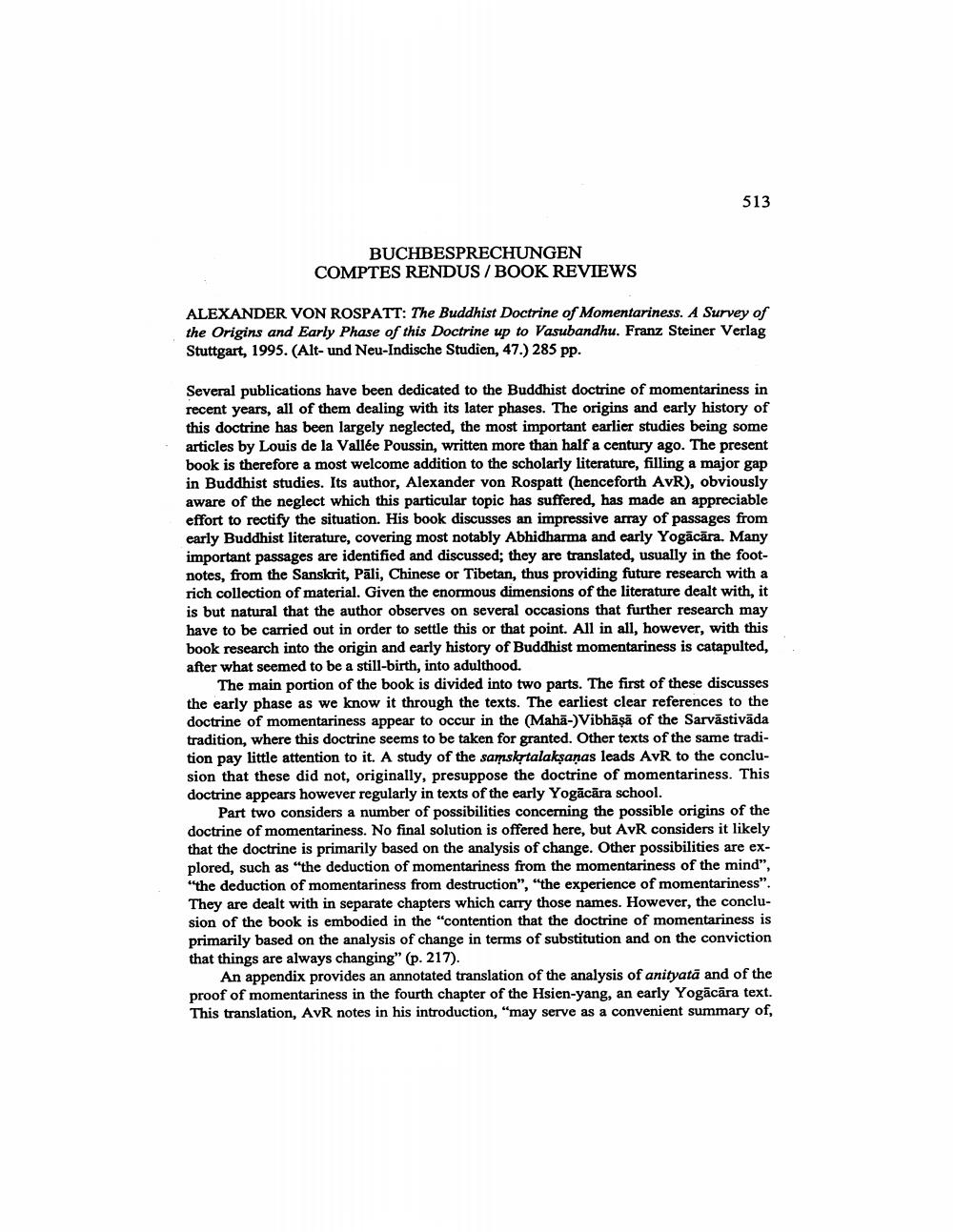Book Title: Buchbesprechungen Comptes Rendus Book Reviews Author(s): Peter Schreiner Publisher: Peter Schreiner View full book textPage 1
________________ BUCHBESPRECHUNGEN COMPTES RENDUS/BOOK REVIEWS 513 ALEXANDER VON ROSPATT: The Buddhist Doctrine of Momentariness. A Survey of the Origins and Early Phase of this Doctrine up to Vasubandhu. Franz Steiner Verlag Stuttgart, 1995. (Alt- und Neu-Indische Studien, 47.) 285 pp. Several publications have been dedicated to the Buddhist doctrine of momentariness in recent years, all of them dealing with its later phases. The origins and early history of this doctrine has been largely neglected, the most important earlier studies being some articles by Louis de la Vallée Poussin, written more than half a century ago. The present book is therefore a most welcome addition to the scholarly literature, filling a major gap in Buddhist studies. Its author, Alexander von Rospatt (henceforth AvR), obviously aware of the neglect which this particular topic has suffered, has made an appreciable effort to rectify the situation. His book discusses an impressive array of passages from early Buddhist literature, covering most notably Abhidharma and early Yogācāra. Many important passages are identified and discussed; they are translated, usually in the footnotes, from the Sanskrit, Pāli, Chinese or Tibetan, thus providing future research with a rich collection of material. Given the enormous dimensions of the literature dealt with, it is but natural that the author observes on several occasions that further research may have to be carried out in order to settle this or that point. All in all, however, with this book research into the origin and early history of Buddhist momentariness is catapulted, after what seemed to be a still-birth, into adulthood. The main portion of the book is divided into two parts. The first of these discusses the early phase as we know it through the texts. The earliest clear references to the doctrine of momentariness appear to occur in the (Maha-)Vibhāṣa of the Sarvästiväda tradition, where this doctrine seems to be taken for granted. Other texts of the same tradition pay little attention to it. A study of the samskṛtalakṣaṇas leads AVR to the conclusion that these did not, originally, presuppose the doctrine of momentariness. This doctrine appears however regularly in texts of the early Yogacara school. Part two considers a number of possibilities concerning the possible origins of the doctrine of momentariness. No final solution is offered here, but AvR considers it likely that the doctrine is primarily based on the analysis of change. Other possibilities are explored, such as "the deduction of momentariness from the momentariness of the mind", "the deduction of momentariness from destruction", "the experience of momentariness". They are dealt with in separate chapters which carry those names. However, the conclusion of the book is embodied in the "contention that the doctrine of momentariness is primarily based on the analysis of change in terms of substitution and on the conviction that things are always changing" (p. 217). An appendix provides an annotated translation of the analysis of anityata and of the proof of momentariness in the fourth chapter of the Hsien-yang, an early Yogacara text. This translation, AVR notes in his introduction, "may serve as a convenient summary of,Page Navigation
1 2 3 4 5 6 7 8
